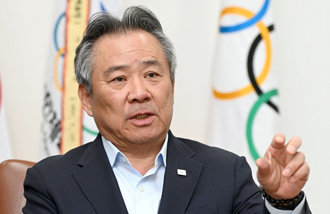Jeopardizing country for elections
The decision by the main opposition Democratic United Party and the minor United Progressive Party to oppose the Korea-U.S. free trade agreement and the construction of a naval base on Jeju Island in their bids to form a coalition for the April 11 general elections constitute an act of serious self-denial. On the trade accord, the former has adopted as its platform a complete renegotiation and the latter scrapping. Renegotiation is possible if and when problems arise in implementation, but complete renegotiation is no different from going back to square one. The main opposition party went to the U.S. Embassy in Seoul and urged the abolition of the deal, only to change its demand to complete renegotiation amid growing negative public sentiment to the move. The party, however, is effectively disregarding the pact, which the Roh Moo-hyun government pursued and concluded.
The free trade agreement is necessary not only to expand Koreas economic territory but also to consolidate the bilateral alliance. The Jeju naval base is needed to protect Korea`s maritime sovereignty, maintain national interests, and develop the Navy into a modern oceanic force. Since the late President Roh was aware of its importance, he aggressively pushed for the project despite strong resistance from within the liberal camp. Han Myeong-sook, chairwoman of the Democratic United Party, said while serving as prime minister under the Roh administration, The Korea-U.S. free trade agreement will provide Korea with new growth momentum to elevate the Korean economy to the ranks of the world`s best. She also said at the time, The construction of the naval base is essential for Korea to cultivate an oceanic navy and protect southern maritime routes for the nation. Other leaders of the Democratic United Party, including executive advisers Lee Hae-chan and Chung Dong-young, also took similar stances back then.
The Democratic United Party did a 180 on its stance when a plan was pursued to form a pan-opposition coalition with the progressive Democratic Labor Party, a die-hard left-leaning force, and others after the inauguration of the Lee Myung-bak administration. As part of preparatory efforts to forge the coalition, the main opposition party changed its principle to shed the stance of centralist reform and moved toward leftist ideology through two party conventions in October 2010 and December last year. With a blind pursuit to form the coalition, the party has effectively dumped national interests and security and is being hopelessly influenced by the United Progressive Party.
The United Progressive Party, spearheaded by the now-defunct Democratic Labor Party, has as a party principle the realization of universal social welfare, scrapping of university rankings, public ownership of housing, reinforcement of the ownership structure of the means of production, withdrawal of U.S. forces stationed in South Korea, and dismantlement of the alliance with the U.S. Lying behind all of this is an anti-American and pro-North Korea ideology, so thus the party is effectively pursuing a socialist system. If the opposition camp forms a coalition and wins in the general and presidential elections, multiple numbers of United Progressive Party members will enter the National Assembly and become Cabinet ministers. If the Democratic United Party continues to be swayed by the progressive party like now, national security, diplomacy and the economy will arise as major concerns.
The Democratic United Party enjoys an approval rating about five to six times higher than the United Progressive Party. Unlikely the latter, the former took power twice in the past and should adequately know the importance of responsibility for state administration, national interest and security. If it is truly a political party that has sense of self-respect and pride, it should not make a grave mistake that could put South Korea on shaky ground just to gain several more parliamentary seats in the general elections.
Headline News
- ‘Literature class with Han Kang’s writing for 10 years,’ says Oxford professor
- Gold price reaches new record high
- Moon Da-hye appears at police after drunk driving accident
- N. Korea redefines S. Korea as ‘hostile state’ in revised constitution
- Samsung develops graphic DRAM with industry-leading capacity and speed







